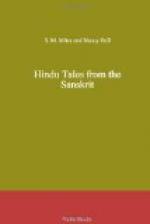3. Do you think this was the best way to find out who had taken the arrow?
4. How would you have set about learning the truth if you had been the king?
CHAPTER III
Now the fact of the matter was that Ayasolekha, who had told the wicked story about Guna-Vara, knew where the king kept the arrow, had taken it to her private rooms, and had sent for her own sons and those of the other wives, all of whom hated Sringa-Bhuja, to tell them of a plot to get their brother into disgrace, “You know,” she said to them, “how much better your father loves Sringa-Bhuja than he does any of you; and that, when be dies, he will leave the kingdom and all his money to him. Now I will help you to prevent this by getting rid of Sringa-Bhuja.
“You must have a great shooting match, in which your brother will be delighted to take part, for he is very proud of his skill with the bow and arrow. On the day of the match, I will send for him and give him the jewelled arrow belonging to your father to shoot with, telling him the king had said I might lend it to him. Your father will then think he stole it and order him to be killed.”
The brothers were all delighted at what they thought a very clever scheme, and did just what Ayasolekha advised. When the day came, great crowds assembled to see the shooting at a large target set up near the palace. The king himself and all his court were watching the scene from the walls, and it was difficult for the guards to keep the course clear. The brothers, beginning at the eldest, all pretended to try and hit the target; but none of them really wished to succeed, because they thought that, when Sringa-Bhuja’s turn came, as their father’s youngest son, he would win the match with the jewelled arrow. Then the king would order him to be brought before him, and he would be condemned to death or imprisonment for life.
Now, as very often happens, something no one in the least expected upset the carefully planned plot. Just as Sringa-Bhuja was about to shoot at the target, a big crane flew on to the ground between him and it, so that it was impossible for him to take proper aim. The brothers, seeing the bird and anxious to shoot it for themselves, all began to clamour that they should be allowed to shoot again. Nobody made any objection, and Sringa-Bhuja stood aside, with the jewelled arrow in the bow, waiting to see what they would do, but feeling sure that he would be the one to kill the bird. Brother after brother tried, but the great creature still remained untouched, when a travelling mendicant stepped forward and cried aloud:
“That is no bird, but an evil magician who has taken that form to deceive you all. If he is not killed before he takes his own form again, he will bring misery and ruin upon this town and the surrounding country.”
You know perhaps that mendicants or beggars in India are often holy men whose advice even kings are glad to listen to; so that, when everyone heard what this beggar said, there was great excitement and terror. For many were the stories told of the misfortunes Rakshas or evil magicians had brought on other cities. The brothers all wanted to try their luck once more, but the beggar checked them, saying:




